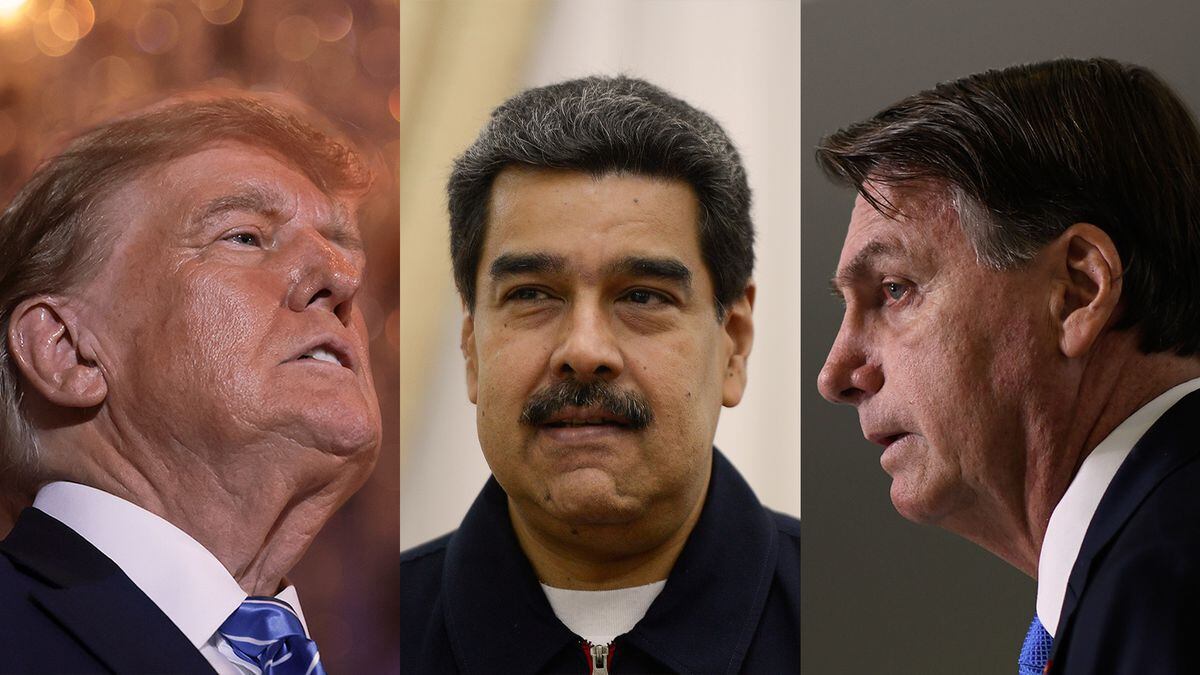Supporters of former Brazilian President Jair Bolsonaro on January 8 in Brasilia.Joedson Alves / Anadolu Agency (Getty Images) (Anadolu Agency via Getty Images)
They merge uprising and hooliganism, they are a threat to democracy and at the same time it is difficult to distinguish them from a parody.
When they're done, much of the discussion is about defining exactly what happened, and that uncertainty makes it harder to avoid or combat them.
On January 8, thousands of supporters of Jair Bolsonaro, the Brazilian presidential candidate defeated in the general elections last October, stormed the Brazilian Congress, the Supreme Court and the presidential palace.
The assault was reminiscent of the 2021 takeover of the Capitol by supporters of Donald Trump.
It was not a casual resemblance: an incumbent of the extreme populist right did not recognize his defeat and, more or less explicitly, encouraged the insurrection.
The former US president had tweeted in front of the television that Vice President Mike Pence did not protect the Constitution.
Bolsonaro, who was abroad, had declared during the campaign that only electoral fraud could justify his defeat.
According to an Atlas survey, 40% of Brazilians thought that there had been fraud in the elections.
Almost 76% disapproved of the assault on government buildings, but 18% approved and 37% said they would support a military coup to reverse Lula's electoral victory.
On January 10, Bolsonaro—who ultimately denounced the violence—issued a video questioning the result (it was later withdrawn).
07:32
Chronology of the assault on Brazilian institutions
More information
This is how we have told you about the assault on the Brazilian Congress by supporters of Bolsonaro
Democracy is knowing how to lose: denying the results damages the entire system.
Sometimes there is an underlying Hobbesian-paranoid interpretation: it is the adversary who will not know how to win and will change the rules, ruin the country and make alternation impossible.
Democracy is not denied, but the adversary is accused of perverting it.
On the one hand, the tactic indicates that we live in nominally democratic times: In an article about the overtly reactionary and rather outlandish far-right plot that attempted to storm the German Parliament in December,
Financial Times columnist
Janan Ganesh said that what should surprise us is that there are so few real reactionaries: people who deny suffrage.
These leaders have not been able to change the Constitution to guarantee their permanence in power: they challenge the electoral process.
On the other hand, this tactic is especially harmful because it attacks the credibility of the democratic system and of the institutions and breaks the informal consensus on which coexistence is based.
There are other recent cases and precedents that are not always cited.
Andrés Manuel López Obrador did not acknowledge his electoral defeat in the 2006 Mexican presidential elections: this irresponsible attitude did not generate the general condemnation that the attitude of Bolsonaro and Trump have received, nor did it prevent him from winning 12 years later.
Sometimes it looks like a case of presbyopia, because what is further away is seen more clearly;
in others, of strabismus or moral hemiplegia, because it is easier to detect anti-democratic impulses in ideological adversaries or because what happens in other countries is immediately recycled as war material for partisan struggle.
But we have observed similar traits in our country: Santiago Abascal spoke of an illegitimate government;
Íñigo Errejón and Alberto Garzón encouraged an attempt to surround Parliament to protest against the formation of a government that they considered illegitimate, and the current Minister of Consumption cast doubt on the electoral count.
The
procés
, an ethnolinguistic rebellion of the rich against the poor, was an essentially anti-democratic movement: that it was presented as a democratic demand may seem paradoxical, but, as we have seen, it is not a novelty.
They are very different cases and with diverse consequences, but they share populist leaders who systematically use lies, irresponsible and clearly aligned intellectuals, media and commentators, a polarization that attributes morally destructive intentions to the other, the cultivation of division and the institutionalization of sectarianism, the assault on institutions and the delegitimization of counter-majority elements.
Often there is an element of cult of personality, and the outbreak, even if it has certain elements of spontaneity, is the product of a gradual work of erosion: the red lines are being erased, the adversary is stigmatized and the entire system is discredited.
One of the most puzzling things about phenomena like those in Washington and Brasilia is that the objectives are not clear: in some cases, the assailants entered and took a selfie.
(In the case of the
process
, part of the discussion revolves around whether the thing was serious or not, and one of the main doubts is whether its leaders believed their own lies).
They are outraged, but that only leads to a quick combination of narcissism and nihilism: most of the time there is more of a destructive mood than a proposal, however misleading.
With its grotesque side, its shrill mood and its delusional interpretation of reality, it is the world of trash TV taking on democratic institutions: there is a component of mimesis and there is another of simulation.
Like many current political movements, it has a
kitsch aspect.
: the one who gets excited contemplating his emotion.
The leaders have unlikely aspects: Pedro Castillo said that a drink had led to his coup attempt, Bolsonaro has said that Lula is in league with the devil.
But the ridiculous part does not mean that they are not dangerous: Félix Romeo already pointed out that one of Hugo Chávez's innovations was to be the first humorous dictator in history.
If a striking feature is the attitude of the leaders, indulgent and sometimes
cheerleaders
of the insurrection, but concerned about avoiding legal consequences, one of the defining aspects of these phenomena is the relationship with violence.
There have been victims in the assaults in Brazil and the United States, but the violence has not been instrumental, partly due to the lack of definition of the objectives.
In Brasilia, the police have been accused of collusion.
But the military has remained loyal to democratic principles: in some countries (such as the United States) it is a tradition, in others it is a decisive change.
The institutions have resisted, and the frivolous and polarizing rhetoric has not led to a social confrontation as it would have occurred at other times.
David Jiménez Torres offered two explanations: on the one hand, that the police and the army are more docile to civil power;
for other,
The societies where these events have occurred are less prone to political violence: the virulence of the discussion in the networks does not transfer to the streets.
According to Ganesh, the monitoring of democracy is necessary, but we should not give the reaction the status of an emerging force: it distracts attention and can lead to a self-fulfilling prophecy.
It is fortunate that the institutions have withstood this stress test and that the violence has not spread.
But it is temporary relief.
Perhaps the main characteristic that postmodern coups share is that they fail, and if one day one succeeds, it will have to be called something else.
but we should not give reaction the status of an emerging force: it is distracting and can lead to a self-fulfilling prophecy.
It is fortunate that the institutions have withstood this stress test and that the violence has not spread.
But it is temporary relief.
Perhaps the main characteristic that postmodern coups share is that they fail, and if one day one succeeds, it will have to be called something else.
but we should not give reaction the status of an emerging force: it is distracting and can lead to a self-fulfilling prophecy.
It is fortunate that the institutions have withstood this stress test and that the violence has not spread.
But it is temporary relief.
Perhaps the main characteristic that postmodern coups share is that they fail, and if one day one succeeds, it will have to be called something else.
Subscribe here
to the weekly newsletter of Ideas.
Subscribe to continue reading
Read without limits
Keep reading
I'm already a subscriber









